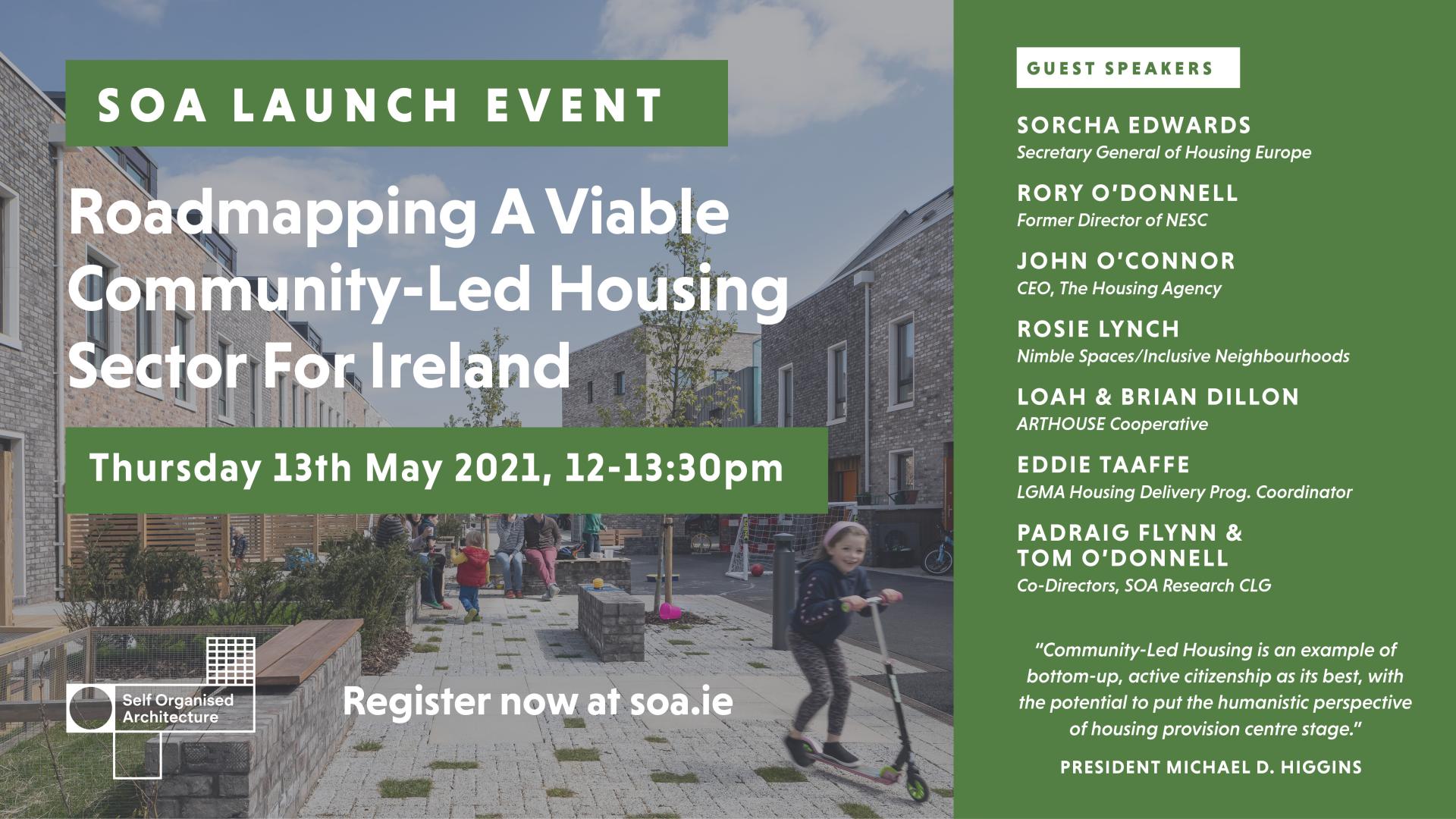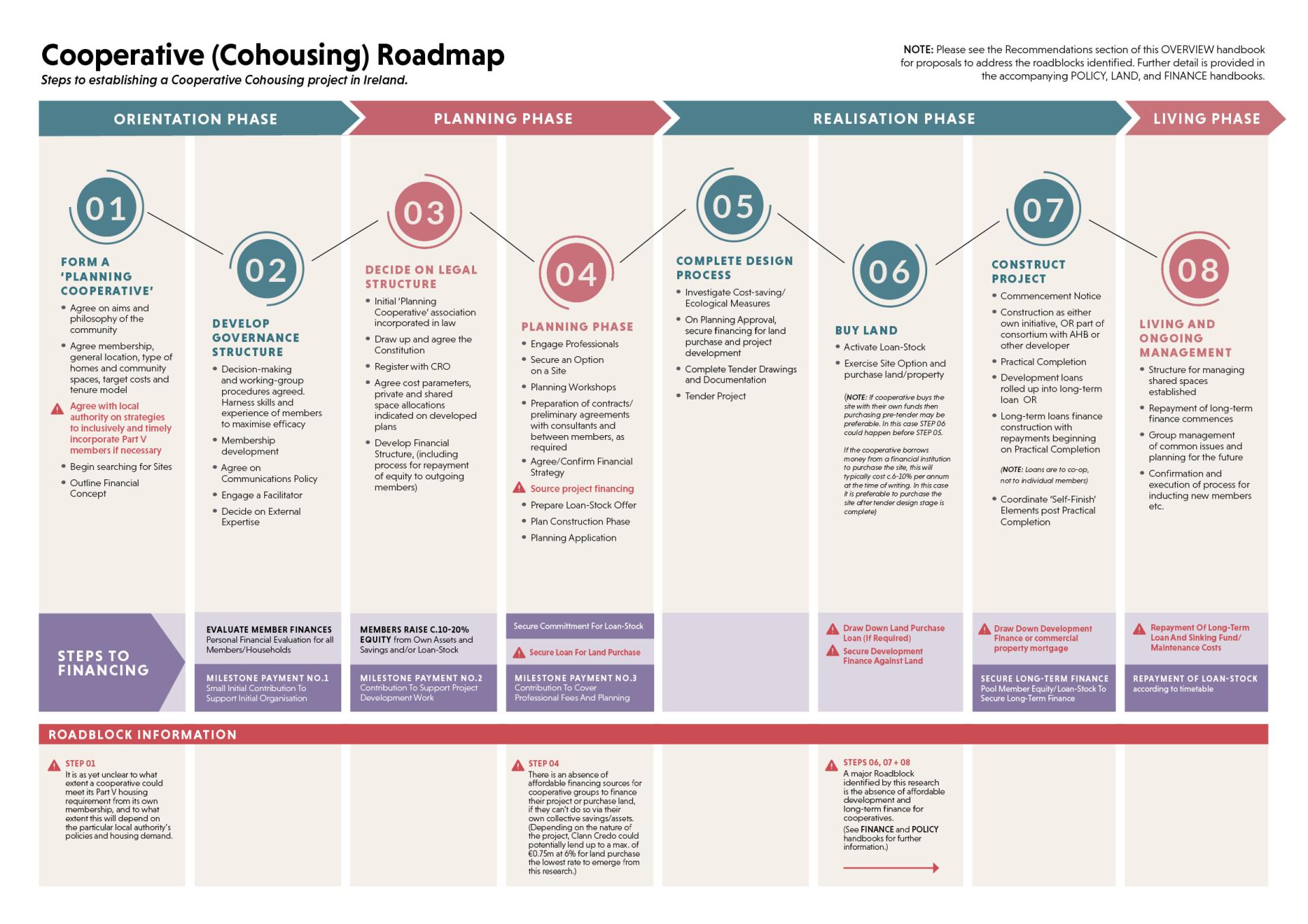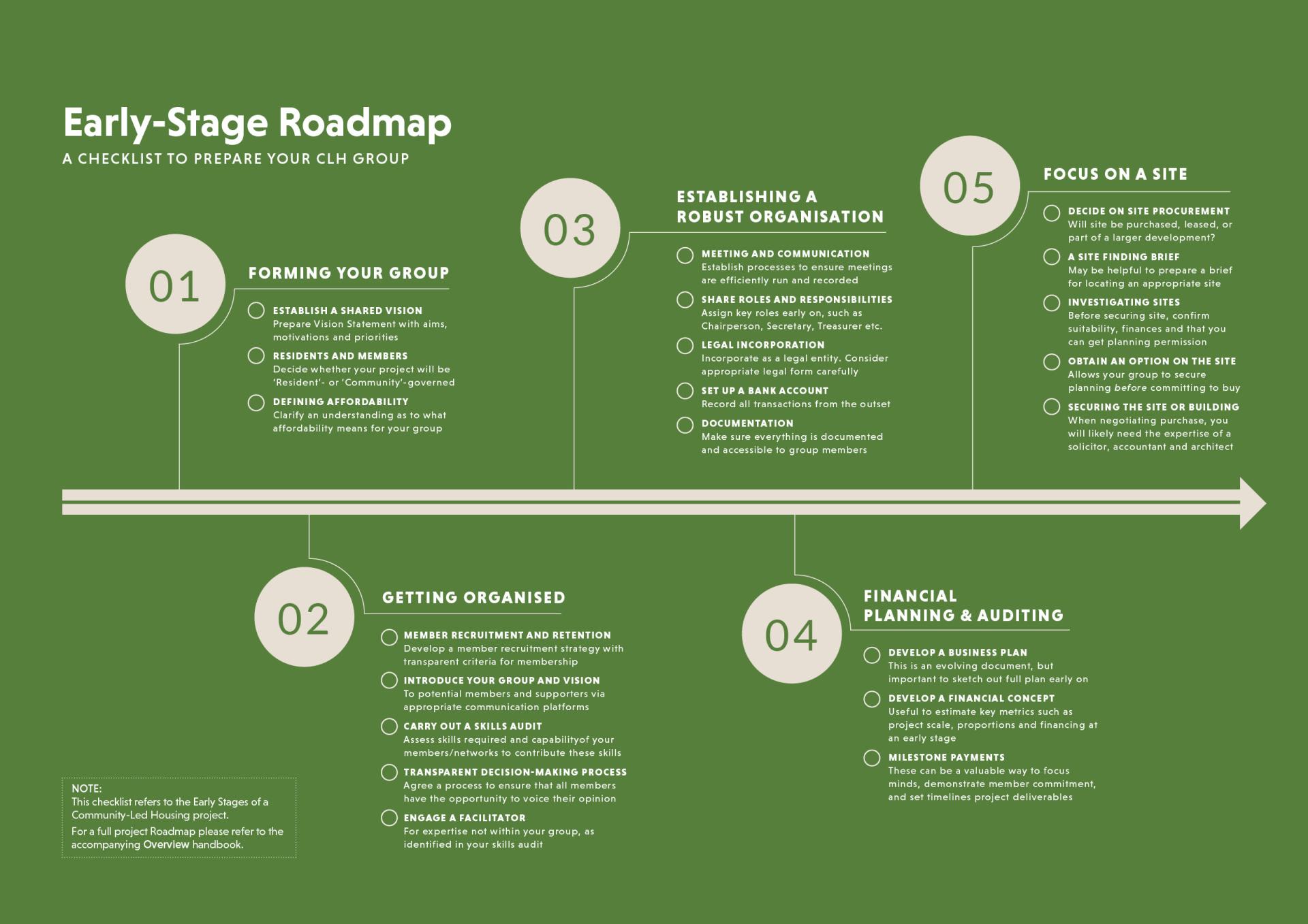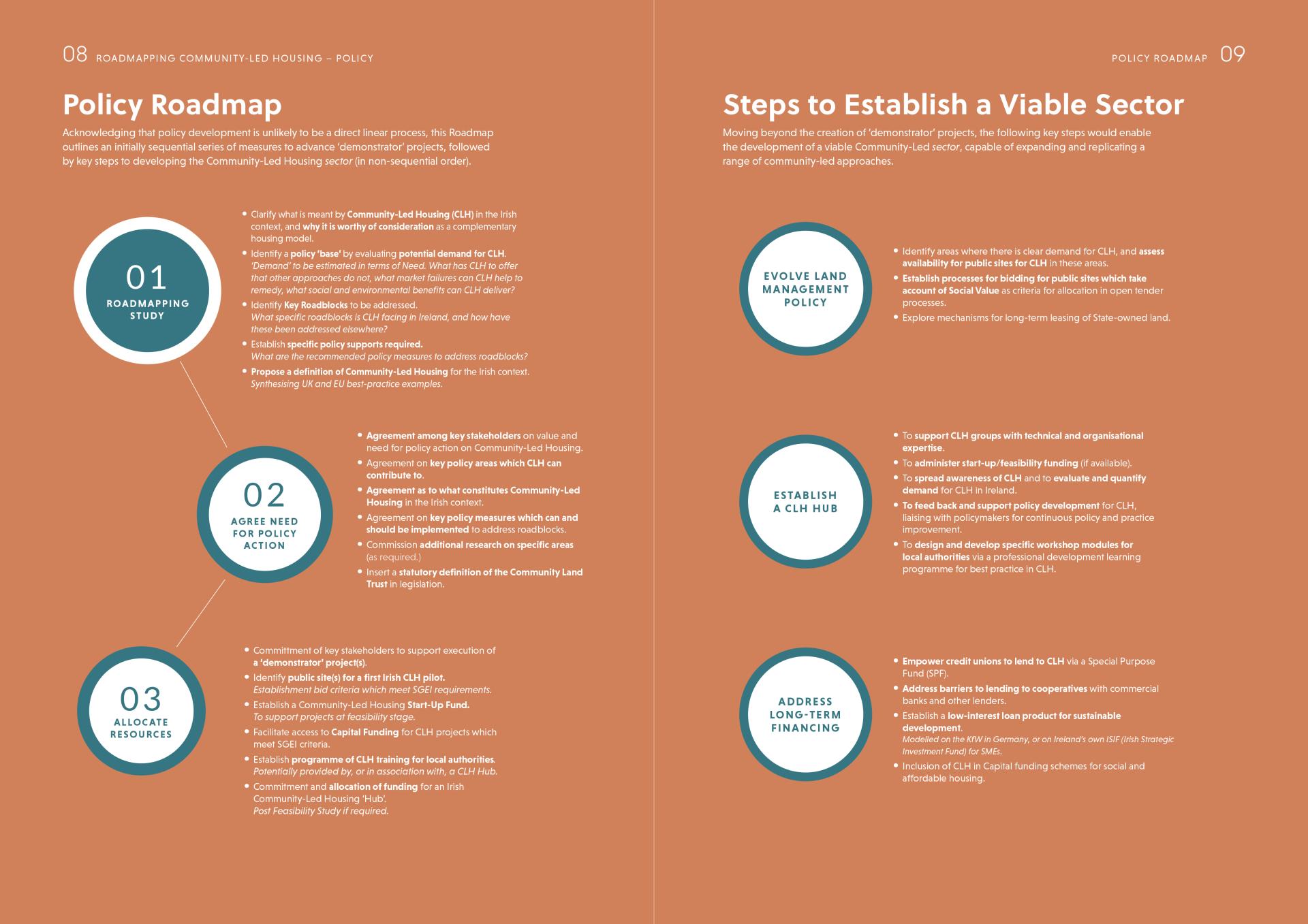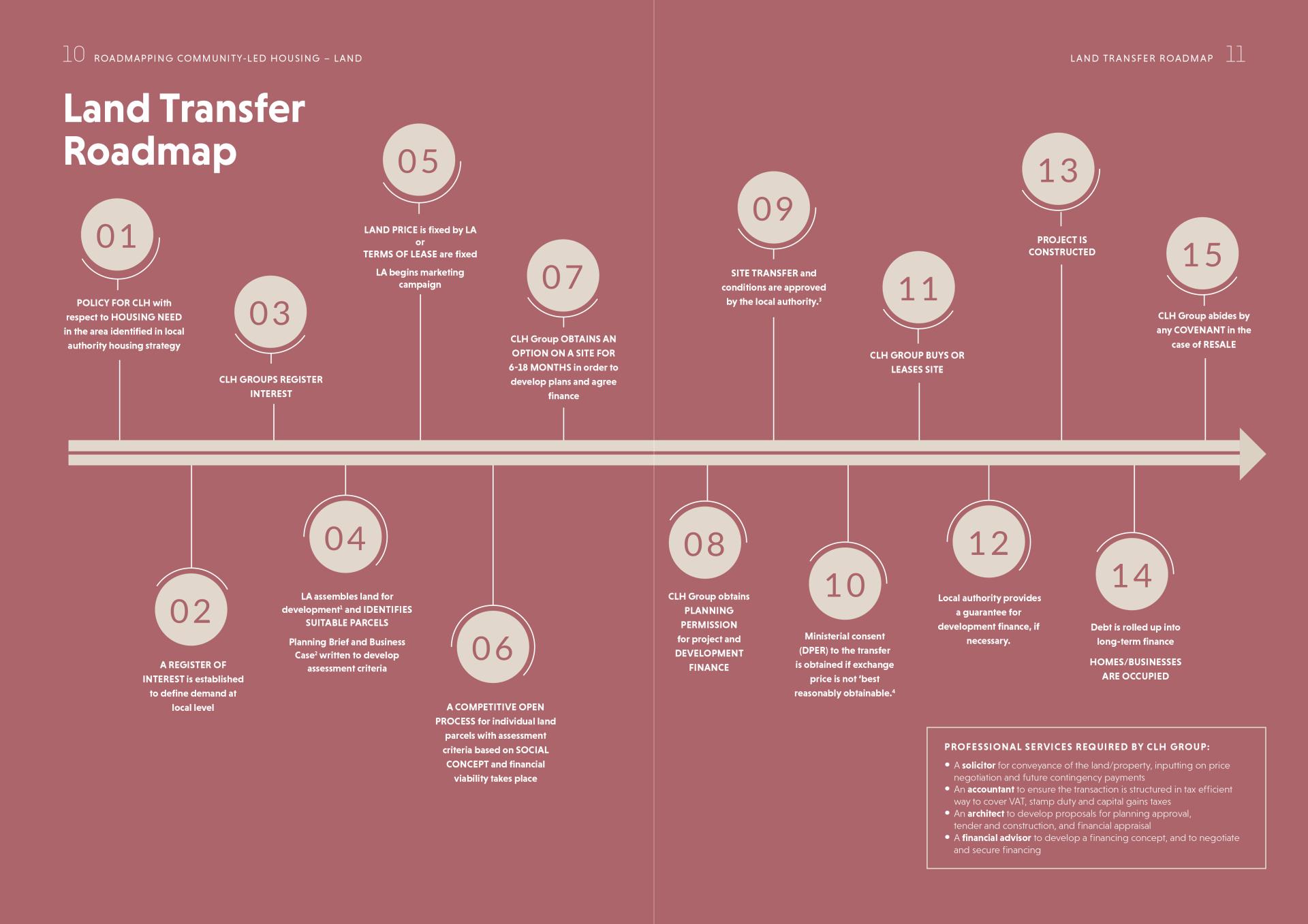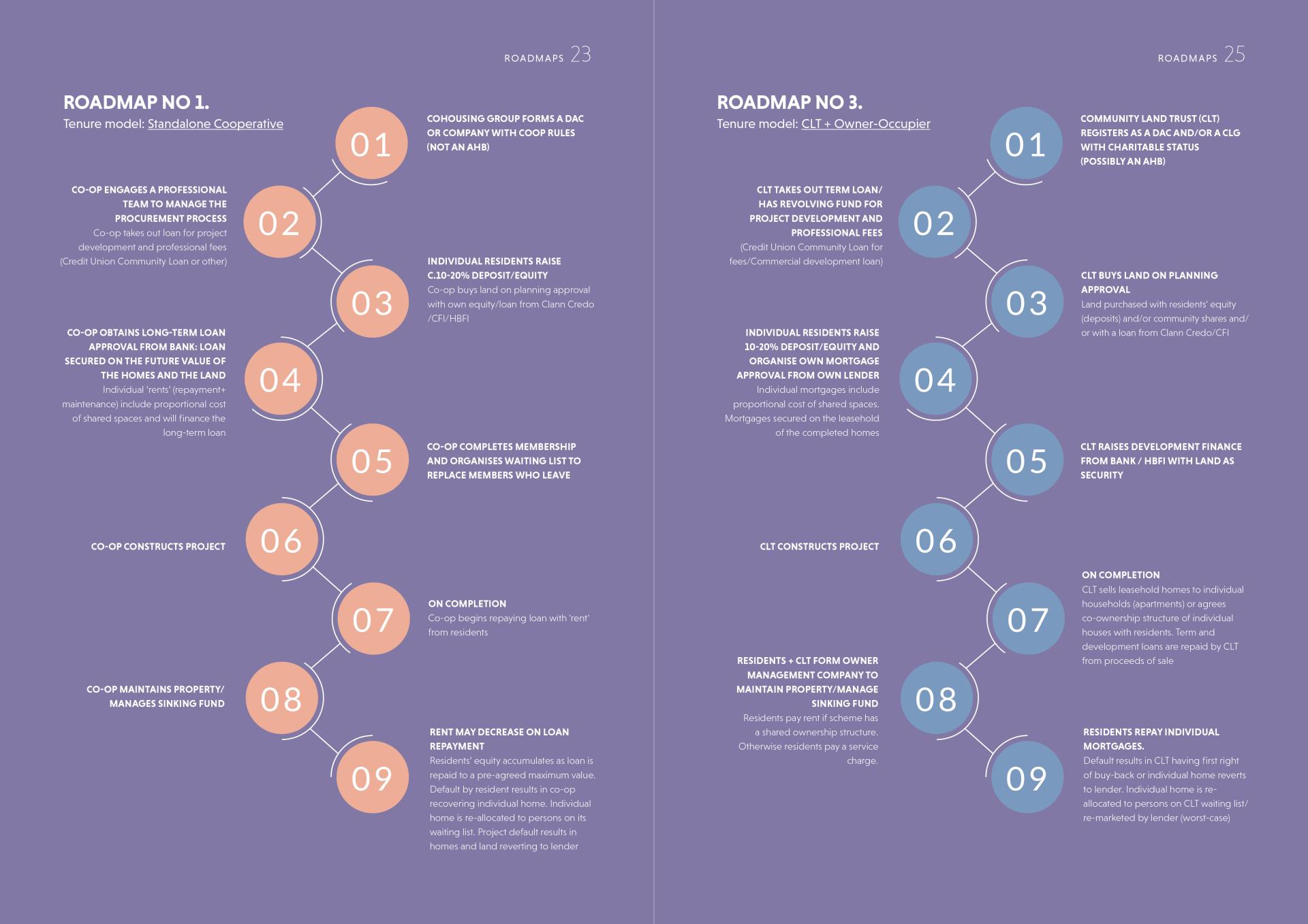Roadmapping Community-Led Housing
Basic information
Project Title
Full project title
Category
Project Description
SOA Research initiated and coordinated a 12-month project to roadmap Community-Led Housing (CLH) in Ireland. Project stakeholders included eight Irish CLH groups as well as public and private sector housing practitioners in Ireland and across Europe.
The resulting publication comprises a series of free handbooks on Community-Led Housing, offering guidance in the areas of Policy, Finance, Land and ‘Getting Your Group Ready’. The project led to recognition in law of CLH in Ireland in 2021.
Geographical Scope
Project Region
Urban or rural issues
Physical or other transformations
EU Programme or fund
Which funds
Description of the project
Summary
“ROADMAPPING A VIABLE COMMUNITY-LED HOUSING SECTOR FOR IRELAND”
Community-Led Housing (CLH) is a ground-up approach, which enables groups of people to pool their assets and collective resources to create homes and communities which meet their particular needs, whatever they may be, in a sustainable manner.
In 2020-21, SOA Research CLG initiated and coordinated a multi-stakeholder project to roadmap a CLH infrastructure for Ireland. The goal of the project is the establishment of a Community-Led Housing sector in Ireland that augments existing routes to creating social an affordable housing in Ireland and empowers low and middle income families to develop homes that meet their present and future needs. It aims to develop a sector that understands housing as a social good.
The publication is intended to inform policy decisions which can facilitate a broad variety of approaches to CLH. The handbooks identify current financial and legal roadblocks and suggest measures to address these. They further explore existing policy instruments and mechanisms that could be utilised to enable the delivery of projects. Recommendations are founded on comprehensive research of supportive policy and best practice for Community-Led Housing in the European Union and the UK.
A priority of the work has been to outline a basis for policy that will enable future civic partnerships between state and local authorities, communities and other stakeholders that make the best use of state land for the long-term benefit of communities.
The resulting publication serves to guide and inform policymakers, Irish CLH groups, related stakeholders, and the wider public generally. It comprises five free Handbooks, offering guidance in the areas of Policy, Finance, Land and ‘Getting Your Group Ready’.
CLH was endorsed by the President of Ireland in his Foreword to the Publication and the project led to the recognition of CLH in law in Ireland for the first time.
NB: See https://soa.ie for Handbooks.
Key objectives for sustainability
-The project proposes a policy turn which emphasises compact brownfield development and also moves in the direction of contemporary international policy on circular and sustainable urban and rural development. The research booklets contain policy and exemplary case studies that outline the role that Community-led Housing can play in sustainable development and regeneration, in addressing vacancy and dereliction. The Community Land Trust in particular, is a model whose role is to coordinate and include different actors for a cooperative approach to urban and rural renewal, in developing and maintaining affordable housing and/or social enterprises and facilities including energy communities.
-The project demonstrates in Policy case studies how meaningful community engagement in the co-design of homes and neighbourhoods is recognised by authorities as leading to innovation in socially and ecologically sustainable housing models that provide an example for the market to follow.
-Our ‘Best Practice’ Policy Survey reveals Community-Led Housing as a genuine form of civic partnership, having mutual benefits for communities, policymakers and wider society. The research highlights community led approaches that address a range of issues typically overlooked by conventional housing. We provide a detailed analysis of best-practice financial, technical and public land management policies adopted in the
UK and other European countries.
Key objectives for aesthetics and quality
-A noticeable aspect of the present discourse around housing is the characterisation of the problem as one of supply, with the proposed remedy usually described in terms of ‘units.’ ‘Delivery’ or ‘provision’ is understood as a sphere for technicians: economists, planners, architects and so on. In this ecosystem, there is a tendency to view future residents as passive recipients who have little or no role in the process of design and development of their home, and whose needs and lifestyle have been anticipated and prescribed by others.
-This project sets out Roadmaps for Community-Led Housing, setting out how residents can co-design all aspects of the development of their homes, including how the project is financed. Community-Led Housing is premised on the conviction that a house is not just a building, or an asset, it is a home: a place to live. As such, community-led approaches take a holistic view of housing and strive to ensure the social, environmental and economic well-being of inhabitants. CLH is a ground-up approach, which enables groups of people to pool their assets and collective resources
to create homes and communities which meet their particular needs, whatever they may be, in a sustainable manner.
-This means residents co-design homes and neighbourhoods that fit their present and future needs and ideals, and NOT how these might be laid down by an authority or a developer, so that quality and aesthetics can be prioritised, even if the budget is low. Residents can develop strategies for phased development, sweat equity etc. that allow the full realisation and adaption of plans over time.
-The ‘Getting Your Group Ready’ Handbook provides guidance for CLH groups on how to establish a sound basis for their visions to be realised.
Key objectives for inclusion
-As part of this project we conducted a needs assessment survey with eight Irish Community-Led Housing groups to inform a reorientation of ‘housing’ to include a broader range of issues that might determine the quality of the home and the empowerment of the resident and community. This encompasses issues such as suitability, affordability in perpetuity, security of tenure, choice and preference, quality of life, quality of urban and rural townscapes, social segregation and loneliness. The project highlights integration of aspects such as structures for community engagement, social facilities and enterprises, play, working, even manufacturing.
-This research highlights how community-led approaches can empower residents and stakeholders to cooperate with future neighbours in meaningful democratic decision making. With appropriate professional and technical support, they are involved in the innovative design of their homes (including developing the financial concept for the project) to address present and future needs.
-The project demonstrated with case studies of exemplary projects across Europe how CLH can offer innovative ways for genuinely inclusive approaches, including multi-generational solutions for mutually supportive communities.
-Land management based on Social Value and the common good allows both communities, and local and state authorities, to align their vision for sustainable development, enabling high-quality, innovative and inclusive housing models to emerge to meet present and future need.
-The booklets set out roadmaps for the present and future development of non-speculative, permanently affordable homes for rent or for purchase, In particular, recommendations are made which will facilitate people on low or irregular incomes, with low savings, or those not qualifying for commercial
mortgages due to age, to adopt these approaches to develop housing that reflects their needs.
Results in relation to category
-The Project was endorsed by the President of Ireland, who agreed to write the Foreword. He writes “I so welcome the ideas put forward by SOA Research in this new book, Roadmapping a Viable Community-Led Housing Sector for Ireland…Community-Led Housing is an example of bottom-up, active citizenship as its best, with the potential to put the humanistic perspective of housing provision centre stage, with communities and citizens at the heart of neighbourhood development, embracing the idea of homes as a social good.”
-The Project's Recommendations for establishing a CLH Sector were agreed on by all stakeholders in the Project, reflecting an achieved consensus across the sector.
-The Project led to the recognition of Community-Led Housing, including the Community Land Trust, in Irish Law for the first time in the Affordable Housing Act 2021.
-The Project led to the introduction to the national discourse of the term 'Community-Led Housing,' which distinguishes the approach from speculative development models, and places the emphasis on quality of homes and neighbourhoods rather than quantity and numbers of units.
-The Project serves as the basis for further policy development for CLH and for referring members of the public interested in Community-Led Housing.
How Citizens benefit
-The core element of the research methodology was a multi-stakeholder process which engaged a wide range of key stakeholders from state agencies and civil society in a community of practice, via a series of four forums and additional bilateral meetings. Each forum focused on a specific theme.
-Stakeholder Forums were complemented by project visits and interviews conducted with a range of Community-Led Housing practitioners and residents across the UK and mainland Europe, with a view to determining best-practice approaches.
-Progress was reviewed at regular intervals by the Project Steering Committee, which was composed of 13 individuals representing a range of stakeholder organisations and associated expertise.
-Workshops were conducted with eight Irish Community-Led Housing groups invited to participate as stakeholders in this project. These projects are based in eight different counties, and represent a range of approaches including housing Cooperatives, Cohousing and Community Land Trusts. Workshops focused specifically on the groups’ approaches to organising and facilitating their membership and their approaches to financial planning.
-Approaches were examined to determine what the groups could achieve by themselves and what support they might require from external sources.
Common roadblocks encountered by the groups were assessed and documented via a survey prepared by SOA.
-Financial strategies were examined with the assistance of financial modelling tools provided by the Community-Led Housing Hub in London and by GLS Bank in Berlin.
-The project thus benefitted from the input of a wide range of expertise and experience from across the sector. As a result, CLH was understood and recognised widely in the Housing sector in Ireland, further informed by the experiences of the participating CLH Groups.
A stakeholder consensus was reached on the Recommendations of the project allowing for a wider acceptance in Policy formation and development.
Physical or other transformations
Innovative character
-The Project gathered together Stakeholders from Government Departments and State agencies, Civil Society including financial institutions, Housing Practitioners and Community-Led Housing (CLH) Groups in a Community of Practice.
-The project connected practitioners from across Europe and included inputs from recognised innovators in the field from Germany, Belgium, France, Switzerland and the UK.
-The Project addressed specific local issues and obstacles to CLH by engaging with Irish Community-Led Housing groups, sector stakeholders and practitioners and local and national policy-makers.
-The Project focussed on practical outcomes: Establishing broad recognition of Community-Led Housing in Civil Society and the Public, and especially in Policy in Ireland.
-The project is a guide for all: from Policy-makers to the Public. Although the project employed academic rigour in a comprehensive approach, addressing all aspects of CLH from a Europe-wide survey of policy supports to papers on state-aid, it was written in jargon-free language so it would be accessible to all.
-Its layout is intended to be clear and to help the reader access the specific information they are looking for quickly. It provides a wealth of sources and case studies for in-depth reading.
-The project is modular in structure allowing for dissemination of specific parts in individual information papers and graphic Roadmaps over time.
-The project outcomes are twofold:
1. Five free Guidance Booklets in print and electronic versions addressing Policy, Finance, Land and 'Getting Your Group Ready.'
2. A set of clear recommendations for policy development to support Community-Led Housing in Ireland.
-The project is free and available to all at
Learning transferred to other parties
-The Project provides a model and methodology for other multi-stakeholder processes, which aim to be inclusive, rigorous and oriented to practical outcomes for the common good.
-The project was structured around Stakeholder Forums, events that addressed specific issues such as Financing or Land etc. Extensive briefing documentation was issued in advance of each forum, and a comprehensive summary report issued afterward. This allowed a clear structure for progressing and tracking consensus.
-Although based on rigorous research, the output is not ‘academic’ and goes further than typical ‘action research’ in involving all relevant actors in a defined process that was not organised or controlled by the state or a dominant actor.
-The project is modular and can be disseminated in small individual papers.
-The project is solution oriented and identified obstacles and developed Roadmaps and Recommendations for overcoming these.
-The project aimed to influence Policy Development and the Discourse on Housing by including a spectrum of voices.
-The project formed the basis for an edition of a popular podcast (https://open.spotify.com/show/5dvaXctN31R11hbWm1ICo8?si=0BjEoP4mTWeb_4TSiJO52Q&nd=1).:

